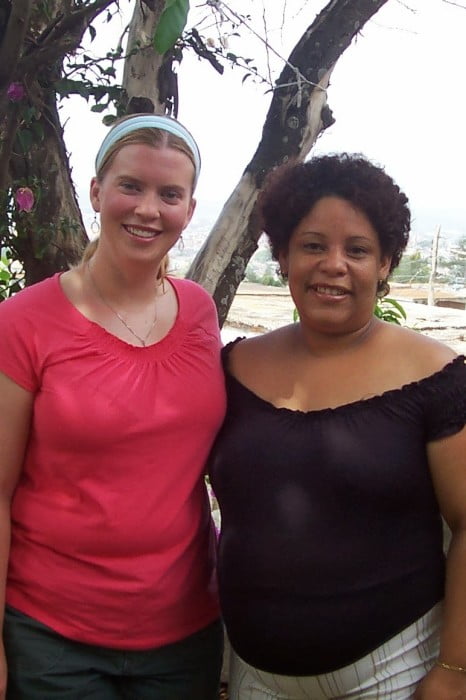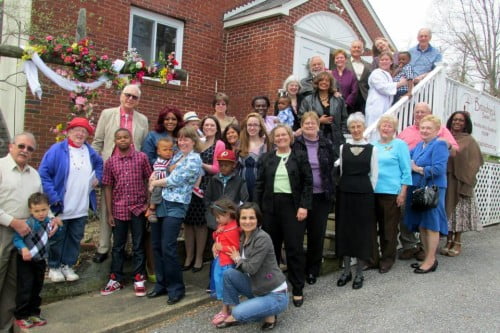 One of the first question people ask when they learn I'm a preacher is, "What kind are you?"
One of the first question people ask when they learn I'm a preacher is, "What kind are you?"
Though there are a thousand ways to answer this question, I know what the person is really asking. They want to know who I am?
They want to know what denomination or faith group I associate with.
They want to know about my ordination.
The answer is simple. I say, "I am Baptist."
(And usually a collective gasp falls over the room).
Soon thereafter, I get questions like, "How is that possible?" "You aren't Southern Baptist are you?" "They don't allow for girl preachers do they?"
The answer is "Yes, it's possible, but no, I'm not Southern Baptist (though I grew up as one)."
And the longer explanation is that was ordained American Baptist. (You can read more about their story here).
The ABC is a group of Baptists that has ecumenical ties to groups like the Disciples of Christ and the Presbyterian Church USA.
And I also find theological kinship with the Alliance of Baptists (You can read more about what they believe here). The Alliance is a progressive group of Baptists closely aligned with the United Church of Christ. (Oh, and I attended a United Methodist seminary!)
Sound complicated? Well, maybe. But, I love being the kind of Baptist that allows for connection to the larger Mainline church in the United States and around the world. I love connection to the historical traditions of the creeds and sacraments. And I love the freedom to not always work in a Baptist church. God's Spirit always is leading us out, I believe!
Recently, I was asked to be one of the columnists for the new Alliance of Baptist blog called Voices. Every couple of months, I submit a post that has as something to do with the conversations going on within progressive Christianity.
I invite you to check out this series here. Some of my recent posts have included:
My fellow columnists have some insightful posts that I'd know you'd love too.
Growing up with a Baptist heritage and now forging a different way to be Baptist with an eye toward social justice, separation of church and state, the priesthood of all believers and most of ecumenism is a delightful place to be!
See, all Baptists aren't what you imagined! And I'm glad to be one of them.
Today our Pentecostal series continues with a guest post from Rev.Abby Thornton Hailey. Abby is a fabulous pastor that I'm so glad the Broadneck Baptist Church in Annapolis, MD gets to hear sermons from every week! In this post, Abby writes about her own experience of coming to love the season of Pentecost. Take a read.
 I don't recall when I fell in love with Pentecost as my favorite Sunday of the year, but I know that I already loved it the first time I spent Pentecost in another country, preaching in a church on the northern coast of Cuba.
I don't recall when I fell in love with Pentecost as my favorite Sunday of the year, but I know that I already loved it the first time I spent Pentecost in another country, preaching in a church on the northern coast of Cuba.
Since I was shortsighted enough to take French in high school, I did not speak a word of my congregation's native Spanish.
Luckily, I did have a translator of sorts--the pastor's daughter (pictured to left), who had learned an amazing amount of English by listening to Carole King and Jackson 5 albums.
Leading up to the sermon, I spent Saturday night working line by line through my manuscript as she painstakingly took notes and asked questions that would help her convey my words to the congregation.
Then, come Sunday morning, preaching went like this: I'd offer a few words, then pause to wait for her to catch up.
There was no way to find a comfortable rhythm, but I worked not to speak over her so that we didn’t drown each other out.
I had absolutely no idea if what she was saying was anything close to what I intended! It was a dramatic exercise in giving up control, in trust, in being constantly aware of what my friend beside me needed.
In these ways, my Cuban Pentecost was a great reflection of what Pentecost teaches us about life together in the church. Every time I read about the miracle of understanding that took place on Pentecost, with each international person hearing God's good news in their own language, I think about the miracle of my own congregation.
When the forty of us gather to worship on Sunday mornings, sometimes six or seven different native tongues are represented—Portuguese, Korean, German, Spanish, Filipino, English, Haitian Creole.
But that might not be our biggest language barrier.
When I think about the different languages we speak in terms of religious upbringing, economic class, ethnic heritage, educational background, age, even basic personality types, it can be overhwhelming.
How, I wonder, do we even communicate with each other amidst such incredible differences of every conceivable sort—let alone begin to learn to communicate with the people who speak an infinite combination of languages just outside of our walls? Still, we do--and when we are listening to each other and seeking to understand, what a beautiful light blazes forth.
Sometimes I do wish Pentecost could wave its magic wand of fire and erase these crazy differences that often lead us into conflict as we struggle to understand each other. But that’s not what Pentecost is about, is it?
The descent of the Spirit that day made us able to love and communicate even amidst our differences. Everyone didn’t end up speaking one language; rather, each person learned to listen carefully and bring voices together to create a new harmony, a new symphony, a new community. God’s Spirit does not make us all the same; rather, it brings oneness as we learn to hear and respect one another, to live together where it seems shared life should be an impossibility.
person learned to listen carefully and bring voices together to create a new harmony, a new symphony, a new community. God’s Spirit does not make us all the same; rather, it brings oneness as we learn to hear and respect one another, to live together where it seems shared life should be an impossibility.
Like me in Cuba, Pentecost people will find themselves starting, stopping, waiting for others to catch up, working carefully not to let their voices drown out another’s, changing their style and approach. But the possibility—ah, the possibility. If we learn to hear what one another are saying, each in our own language, and take the time to communicate not just in our language but in a way attuned to the language of those around us…what, I wonder, could happen then?